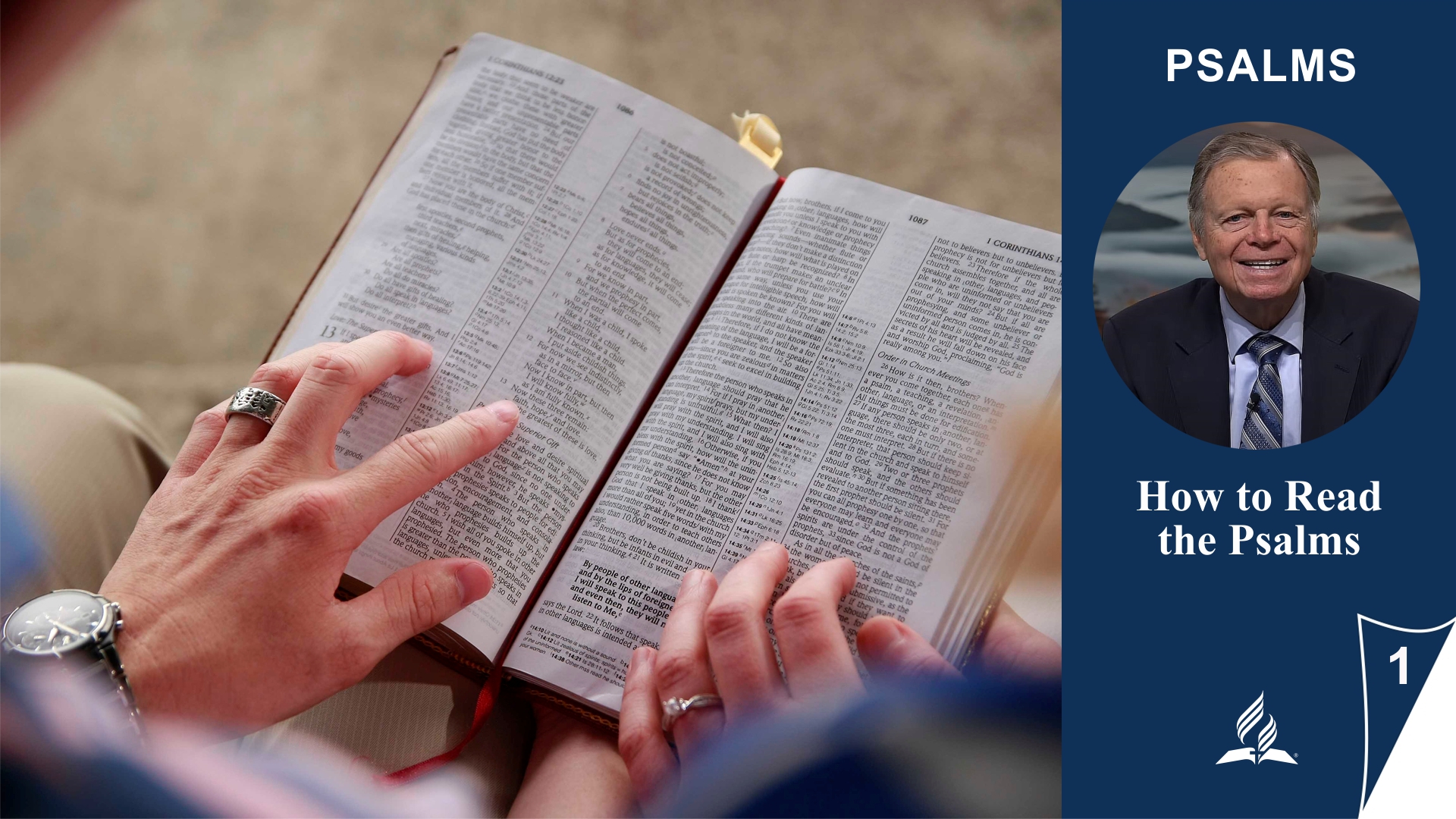
Series PSALMS with Pastor Mark Finley |
Lesson 1: How to Read the Psalms |
The first lesson introduces us to the fascinating world of the Psalms, a collection of poetic expressions that represent the heart and soul of worship in ancient Israel. From their use in worship to their diverse themes and the inspired prayers and praises of the Psalmists, we will gain a deep insight into the meaning and timeless relevance of these biblical texts. This lesson will take us on a journey through the Psalms, exploring their cultural, emotional, and spiritual depth.
Memory Text: Luke 24:44.45 – “Then He said to them, ‘These are the words which I spoke to you while I was still with you, that all things must be fulfilled which were written in the Law of Moses and the Prophets and the Psalms concerning Me.’ And He opened their understanding, that they might comprehend the Scriptures.”
Content:
1.1 The Psalms in Ancient Israel’s Worship
Designed as hymns of praise, the Psalms served both private and communal worship in ancient Israel. In the temple, they were performed as hymns with instruments, melodies, and lead singers. Their use extended from temple dedications to religious festivals and pilgrimages to Jerusalem, with specific Psalms sung on festive occasions. The Psalms were not only an integral part of Israelite worship but also a source of inspiration for prayer and liturgy, as evident in the teachings of Jesus and the writings of the early Church.
1.2 Meet the Psalmists
The Psalms provide insight into the diverse experiences of their authors, including King David, Asaph, the sons of Korah, Heman, Ethan, Solomon, and Moses. The Holy Spirit inspired these Psalmists, who, despite deep faith, also faced discouragements and temptations. The timeless themes in the Psalms, from needs to joys, reflect human experiences and demonstrate that cries for deliverance and praises of divine faithfulness remain relevant to this day. The Psalms are not only historical testimonies but also sources of hope and expressions of God’s grace amid human challenges.
1.3 A Song for Every Season
The Psalms, as seen in examples like Psalm 3, 33:1–3, and 109:6–15, reflect the diversity of human experiences. From hymns praising God’s majesty to thanksgiving songs for His blessings and lament Psalms earnestly pleading for deliverance, they cover a broad spectrum. Wisdom Psalms offer practical life guidelines, royal Psalms point to Christ as the sovereign King, and historical Psalms recall Israel’s past. The poetic power of the Psalms is enhanced through devices like parallelism, imagery, merism, and wordplay, and the recurring element “Selah” invites reflection. Thus, the Psalms provide an expression of worship and reflection for every life situation and mood.
1.4 Inspired Prayers
The Psalms are not only inspired prayers and praises of Israel but also expressions of a vibrant interaction between God and His people. In personal invocations like “my God” and “LORD of hosts,” the Psalmists actively seek God’s presence. The beauty of the Psalms lies in representing God’s Word in the form of prayers and praises from believers. Romans 8:26–27 emphasizes the Holy Spirit’s help in prayer, a dynamic also reflected in the Psalms. The versatility of the Psalms, from hope to sorrow, makes them timeless and relevant to people of all cultures and ages. Jesus himself quoted from the Psalms, and their spiritual depth speaks to the diverse experiences and challenges people face in their lives.
1.5 The Words of the Psalms
The Psalms are infused with an oriented attitude toward God, who, as the sovereign Creator, King, and Judge, occupies the center of the Psalmists’ lives. Trust in God extends across all life experiences, and the Psalms emphasize His omnipresence and care. Even in difficult times, the Psalmists remain focused on calling upon and praising God. The worship in which the Psalms were used formed the center of the biblical community’s life, expressing everything within it. The Psalmists grasp the dual attributes of God, both distant and near, in His heaven and amid His people. They understand this tension as an inseparable part of spiritual reality, and their awareness of God’s goodness strengthens their hope for His intervention.
1.6 Summary
The first lesson on the Psalms highlights their diverse use in the worship of ancient Israel, both privately and communally. The Psalms reflect the experiences of various authors, including King David, and offer timeless themes from needs to joys. Their broad spectrum includes hymns, thanksgiving songs, lament Psalms, wisdom Psalms, royal Psalms, and historical Psalms. The Psalms are inspired prayers and expressions of a vibrant interaction with God, with the Holy Spirit playing a central role in prayer. The Psalms are infused with an oriented attitude toward God, who stands at the center of life, emphasizing His omnipresence and care, while the tension between closeness and distance is understood as an inseparable part of spiritual reality.
Visited 43 times, 1 visit(s) today






